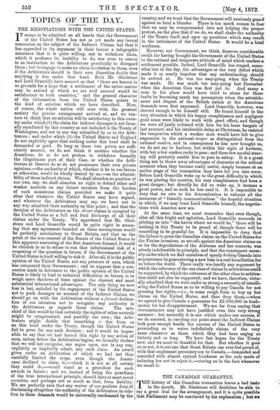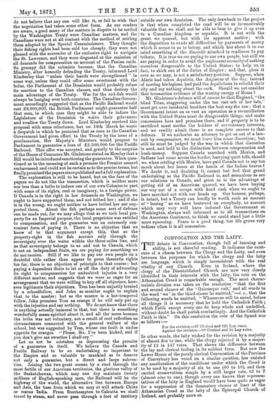THE CANADIAN GUARANTEE.
THE history of this Canadian transaction leaves a bad taste in the month. Mr. Gladstone will doubtless be able to say a great deal for the arrangement, and it is quits possible that Parliament may be convinced by his explanation ; but we do not believe that any one will like it, or fail to wish that the negotiation had taken some other form. As our readers are aware, a good many of the matters in dispute to be settled by the Washington Treaty were Canadian matters, and the Canadians were not at all content with the method of settling them adopted by the Special Commissioners. They thought their fishing rights had been sold too cheaply, they were not pleased with the surrender of the exclusive right to navigate the St. Lawrence, and they were disgusted at the omission of all demands for compensation on account of the Fenian raids. So grumpy did the colonists become, that the Canadian Ministry, after honestly defending the Treaty, informed Lord Kimberley that "unless their hands were strengthened " in some way, unless they could offer some sweetmeat with the bolus, the Parliament of the Dominion would probably refuse its sanction to the Canadian clauses, and thus destroy the main advantage of the Treaty. War for the cod-fish would always be hanging over both countries. The Canadian Govern- ment accordingly suggested that as the Pacific Railroad would cost £8,000,000, the British Parliament might guarantee half that sum, in which case they might be able to induce the Legislature of the Dominion to waive their grievances and swallow the Treaty down. Lord Kimberley received this proposal with some reluctance, but on 18th March he wrote a despatch in which he promised that as soon as the Canadian Government had given effect to the Treaty by the issue of a proclamation, Her Majesty's Ministers would propose to Parliament to guarantee a loan of £2,500,000 for the Pacific Railroad. This offer was accepted, and greatly to the surprise of the House of Commons Mr. Gladstone stated on Monday that a Bill would be introduced sanctioning the guarantee. When ques- tioned as to the meaning of such a promise the Premier seemed embarrassed. and could not be certain as to the precise terms, but finally promised the papers since published and a full explanation.
The explanation is still to be heard, but on the face of the papers we do not like the transaction, which is neither more nor less than a bribe to induce one of our own Colonies to part with some of its rights, real or imaginary, to a foreign power. If Canada is in the right in her demands on Washington, we ought to have supported them, and not bribed her ; and if she is in the wrong, we ought neither to have bribed her nor sup- ported them. About the fish perhaps some sort of defence can be made out, for we may allege that as we took local pro- perty for an Imperial purpose, the local proprietor was entitled to compensation, and the guarantee was an extremely con- venient form of paying it. There is no objection that we know of to that argument except this, that as the property-right in the fish accrues only through the sovereignty over the water within the three-miles line, and as that sovereignty belongs to us and not to Canada, which is not an independent State, we are paying for something we do not receive. Still if we like to pay our own people on a doubtful title rather than appear to press theoretic rights too far, there is no objection of principle to that course ; but paying a dependent State to let us off the duty of advocating its right to compensation for undoubted injuries is a very different matter, and suggests that we were so eager for an arrangement that we were willing to buy off all objectors, how- ever legitimate their objections. Tom has been unjustly treated by a schoolfellow, and John as monitor ought to explain that to the master; but as the master is a hot-tempered fellow, John promises Tom an orange if he will only put up with the injustice and say nothing. We do not know that there is anything actually immoral in that, but there is something wonderfully mean-spirited about it, and all the more because the bribe was not voluntary, not a result of cool reflection on circumstances connected with the general welfare of the school, but was suggested by Tom, whose one fault is undue appetite for oranges. " Please, Sir, I've been kicked, and if you don't give me sweeties I shall cry."
Let us not be mistaken as deprecating the promise of a guarantee in itself. We believe the Canada and Pacific Railway to be an undertaking so important to the Empire and so valuable to mankind as to deserve not only a guarantee, but a direct and large subven- tion. Joining the two great oceans by a road through the most fertile of our American territories, the glorious valley of the Saskatchewan, which may one day maintain twenty millions of English-speaking men, the Railroad will be the highway of the world, the alternative line between Europe and Asia, the base from which we may at will attack China or rescue India. From Southampton to Calcutta we shall travel by steam, and never pass through a foot of territory
outside our own dominion. The only drawback to the project is that when completed the road will be so inconceivably valuable that we shall not be able to bear to give it up even to a Canadian kingdom or republic. It is not with the grant we quarrel, but with its apparent motive ; with the disposition to evade all difficulties by payments of money which it seems to us to betray, and which has about it to our mind something of the discredit attached to readiness to pay tribute. It is true we are paying to our own people, but still we are paying in order to avoid the unpleasantnecessity of making ourselves disagreeable to the United States ; to help us, in fact, to shirk one of the duties of Empire ; and that, gloss it over as we may, is not a satisfactory position. Suppose, when Alaric had taken Aquileia, the Augustus of the day, instead of moving his legions, had paid the Aquileitans to rebuild their city and say nothing about the sack. Should we not consider that transaction evidence of the waning energy of Rome ?
Mr. Gladstone's defence will of course be that England, "the blind Titan, staggering under the too vast orb of her fate," must get over incidental boulders the best way she can ; that a Government intent on so vast an operation as a reconciliation with the United States must do disagreeable things, and make concessions here and promises there, and if property is to be sacrificed must soothe the holders of reversionary interests, and we readily admit there is no complete answer to that defence. If we authorise an attorney to get us out of a law- suit by compromises, we must leave him some discretion ; but still he must be judged by the way in which that discretion is used, and held to the distinction between compensation and hush-money. Suppose Canada marched with Mexico, and Indians had come across the border, harrying quiet folk, should we, when settling with Mexico, have paid Canada not to say too much about her losses at the hands of the Indian braves We doubt it, and doubting it, cannot but feel that grand undertaking as the Pacific Railroad is, and anomalous as are our relations to Canada, and great as is the advantage of getting rid of an American quarrel, we have been buying our way out of a scrape with hard cash when we ought to have marched out with our heads up. Our honour, perhaps, is intact, but a Treaty can hardly be worth such an amount of " booing " as we have bestowed on everybody, an amount which may very well have induced the Government at Washington, always well informed as to all transactions on the American Continent, to think we could stand just a little more squeezing. Peace is a good thing, but life grows very tedious when it is all concession.



































 Previous page
Previous page